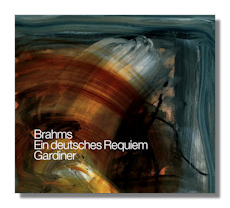
The Internet's Premier Classical Music Source
Related Links
-
Brahms Reviews
Schütz Reviews - Latest Reviews
- More Reviews
-
By Composer
-
Collections
DVD & Blu-ray
Books
Concert Reviews
Articles/Interviews
Software
Audio
Search Amazon
Recommended Links
Site News
 CD Review
CD Review
Ein Deutsches Requiem

- Johannes Brahms: German Requiem, Op. 45
- Heinrich Schütz :
- Psalms of David, Op. 2:
- Wie lieblich sind deine Wohnungen, SWV 29
- Selig sind die Toten, SWV 391
Katharine Fuge, soprano
Matthew Brook, baritone
The Monteverdi Choir
Orchestre Révolutionnaire et Romantique/John Eliot Gardiner
Live - August, 2008 at Usher Hall, Edinburgh (Brahms);
October, 2007 at Royal Festival Hall, London (Schütz)
Soli Deo Gloria SDG706 77min
Sir John Eliot Gardiner's 1991 recording of the Brahms Requiem was notable for its brighter take on this work, which featured very brisk tempos and what some called an unsentimental approach. Well, this effort, which offers the same orchestra and choir, features marginally faster tempos, better sound and different but quite capable soloists. I have quite a few Brahms Requiems in my collection and I've heard a few others, and this new one by Gardiner is the fastest, with Gardiner's 1991 coming in a close second. But is that in any way a telltale indication of the artistic worth of the performance?
Of course not, but it tells you Gardiner's leaner approach is more Classical than Romantic, and more spirited than probing. Let me say right off, too, that this recording features the best choral singing in this work I've ever heard, and while the Brahms Requiem allows for many different vantage points, I would take Gardiner's interpretation here over anyone else's. Gardiner imparts a truly energetic sense: try his sixth movement, "Denn wir haben…" for about the most dramatic and compelling version of this music you'll hear. And so much else is convincing, especially the third panel, "Herr, lehr doch mich", whose ending brims with vitality and glorious, heavenly music. The latter pages of #2, "Denn alles Fleisch…", also take on a brighter, more optimistic character than usual.
But, you ask, is this brighter approach appropriate to a Requiem? Brahms, you'll remember, wanted his Requiem to serve as a consoling and comforting experience, not as a commemoration of the dead or an examination of the afterlife. Brahms was not a man of deep faith: Dvořák commented, "He believes in nothing." That assessment was probably a bit harsh, as Brahms might more accurately been called an agnostic. But then we don't know for sure what he was. We do know, however, that this is not a Requiem that featured a Dies Irae or other more traditional or more terrifying associations with death. Neither did Brahms set Latin texts. So, his Requiem was indeed different in mood and character from most other Requiems and thus can certainly be regarded as brighter and deserving of less Wagnerian and less funereal approaches.
Gardiner's soloists, baritone Matthew Brook, and soprano Katharine Fuge, are quite splendid. In "Herr, lehre doch mich", Brook is simply stunning and sings with total commitment. Fuge sings beautifully in "Ihr habt nun Traurigkeit", her voice having an almost angelic purity in its slightly restrained tones.
The Schütz pieces, which come first on the disc, are included because, as the album notes explain, Brahms admired Schütz and the texts both composers use here partially overlap. In any event, the two Schütz settings are beautifully performed by the Monteverdi Choir and make nice companion works. The sound is vivid and powerful on all selections.
As for comparisons, I recently reviewed the Christian Thielemann rendition of the Brahms Requiem on a Unitel Classica/Cmajor DVD and found the performance quite beautiful, despite the fact the timing is about fifteen minutes slower than Gardiner's! As I say, Brahms allows for different vantage points of this work, including some radically different ones. If you prefer a more Romantic and probing approach to the Requiem, then Thielemann may well satisfy you. The Philippe Herreweghe recording on Harmonia Mundi and Marek Janowski on Pentatone also feature brisk performances and are eminently worthwhile. Levine's earlier RCA recording features moderate tempos and very fine singing by Kathleen Battle and Håkan Hagegård.
In sum, despite fierce competition in this great work, Gardiner must be given the edge over the others.
Copyright © 2012 by Robert Cummings.





















